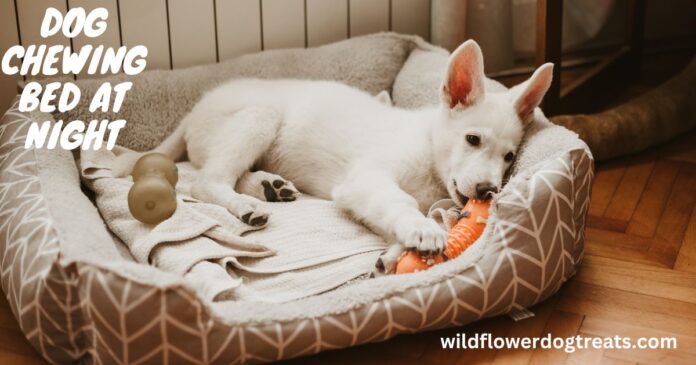Dogs may chew their beds at night due to stress, boredom, lack of exercise, or separation anxiety. Dog Chewing Bed at Night. This behavior is a way for them to cope with their emotions and release energy.
Providing ample exercise, mental stimulation, interactive toys, and a comfortable, safe space can help address this issue. Additionally, using deterrent sprays or seeking behavior therapy may also be beneficial in stopping this behavior. It is important to understand the root cause of the chewing and address it accordingly to prevent any harm to the dog and their belongings.
Regular training and a consistent routine can further assist in curbing this behavior.
Causes Of Bed Chewing
Dogs may chew their beds at night due to lack of exercise or mental stimulation, leading to boredom. Anxiety and stress can also trigger this behavior. Providing chew toys, behavior therapy, and ensuring ample exercise can help prevent bed chewing.
Consider investing in a more durable bed and using deterrent sprays as a solution.
Separation Anxiety
Dogs can experience separation anxiety when left alone, leading to stress and anxious behaviors such as bed chewing.
Boredom
If a dog lacks mental and physical stimulation, they may resort to chewing their bed out of boredom.
Teething
Teething puppies may chew on their beds to alleviate the discomfort of new teeth coming in.
Lack Of Exercise
Dogs that do not receive sufficient exercise or mental stimulation may engage in destructive behaviors like bed chewing.
Behavioral Training
Dogs chewing their beds at night can be a frustrating and confusing behavior for pet owners. However, with proper behavioral training, this issue can be addressed and resolved effectively. By understanding the underlying reasons for this behavior and implementing targeted training, owners can help their dogs stop chewing their beds and ensure a restful night’s sleep for both the pet and themselves.
Positive Reinforcement
Positive reinforcement is a powerful tool in modifying a dog’s behavior. When a dog exhibits the desired behavior, such as not chewing the bed, it is essential to offer positive reinforcement immediately. This can include verbal praise, treats, or affectionate gestures. By consistently rewarding the dog for not chewing the bed, it associates the behavior with positive outcomes, encouraging them to repeat it.
Redirecting Behavior
Redirecting your dog’s chewing behavior is another effective strategy. Providing appropriate chew toys and interactive items can redirect their attention away from the bed. When the dog starts to chew its bed, gently redirect its focus towards the designated toys, encouraging it to engage with them instead. Consistency and patience are vital in reinforcing this redirection process.
Interactive Toys
Interactive toys can play a significant role in preventing nighttime bed chewing. These toys are designed to stimulate the dog mentally and physically, providing an outlet for their natural instincts and energy. Interactive toys, such as puzzle feeders or treat-dispensing toys, can keep the dog engaged and entertained, reducing the likelihood of destructive chewing behavior.
Environmental Modifications
Environmental modifications can help address why your dog chews his bed at night. Offering appropriate chew toys, providing mental and physical stimulation, and removing stressors can redirect their behavior. Additionally, ensuring a suitable sleeping area and supervising them when necessary can help prevent destructive chewing.
Providing Chew-friendly Beds
When selecting a bed for your dog, consider providing a chew-friendly option. Opt for durable materials such as heavy-duty canvas or nylon that can withstand your dog’s chewing habits. Additionally, look for reinforced seams and chew-resistant features to prolong the bed’s lifespan.
Dog-proofing Sleeping Area
To prevent your dog from chewing his bed at night, dog-proof the sleeping area by removing any potential hazards or items that may encourage chewing. Ensure the space is free of loose fabric, strings, or other enticing materials that could prompt chewing behavior. Consider using a crate or designated sleeping area to limit access to tempting objects.
Professional Interventions
Behavior Therapy
If your dog is chewing his bed at night, behavior therapy can be an effective intervention to address this issue. Behavior therapy involves modifying your dog’s behaviors through positive reinforcement, training, and environmental management. With the help of a professional dog trainer or behaviorist, you can identify the underlying reasons for your dog’s destructive behavior and implement targeted strategies to address it.
Consultation With A Veterinarian
Consulting with a veterinarian is crucial when dealing with a dog’s nighttime chewing behavior. It’s important to rule out any underlying medical issues that could be contributing to this behavior. A veterinarian can conduct a thorough examination to check for dental problems, gastrointestinal issues, anxiety, or other medical conditions that may be causing your dog to chew his bed at night. Based on the diagnosis, the veterinarian can recommend appropriate medical interventions or treatments to address the underlying health concerns.
Frequently Asked Questions Of Why Does My Dog Chew His Bed At Night
How Do I Get My Dog To Stop Chewing His Bed At Night?
To stop your dog from chewing his bed at night, offer chew toys and supervise them closely. Provide a blanket or a suitable alternative for sleeping. Address any underlying anxiety or boredom by exercising and engaging your dog both mentally and physically.
Consider behavior therapy and deterrent sprays if necessary.
How Do I Stop My Dog From Destroying His Bed?
To stop your dog from destroying his bed, provide chew toys, a blanket, and enough exercise and mental stimulation. Consider behavior therapy and deterrent sprays to eliminate anxiety. Supervise your dog and offer suitable toys. Invest in a chew-proof bed as a long-term solution.
How Do I Get My Dog To Stop Chewing Everything At Night?
To stop your dog from chewing everything at night, provide them with appropriate chew toys. Remove their bed when unsupervised, and offer a blanket as an alternative. Eliminate stressors, provide mental and physical stimulation, and consider behavior therapy. Supervise their chewing and provide distinct toys.
Why Does My Dog Chew At Bedtime?
Dogs may chew at bedtime due to lack of exercise or mental stimulation. They might be looking for ways to entertain themselves, and chewing is one option. Providing ample opportunities for mental and physical exercise can help prevent destructive chewing.
Offering chew toys and removing stressors can also be beneficial.
Conclusion
If you find your dog chewing his bed at night, take it as a sign of a possible issue. It could be due to anxiety, boredom, or lack of exercise. To address this behavior, provide mental and physical stimulation, toys, and a comfortable sleeping area.
If the problem persists, consult a professional for guidance.




